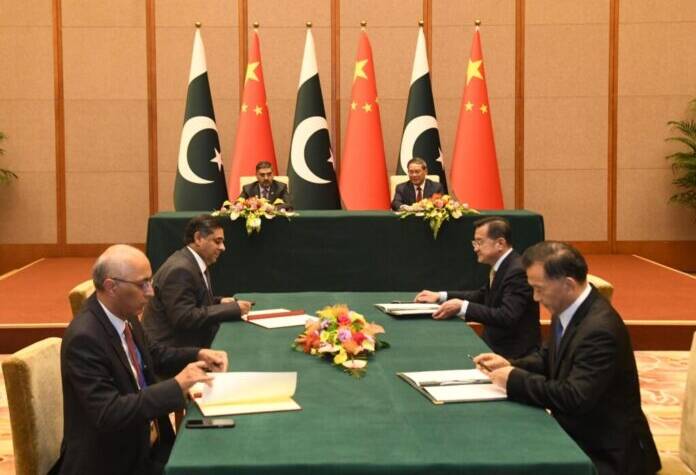ISLAMABAD: Pakistan and China Seal the Deal on Multi-Billion-Dollar ML-I Railway Project
The recent signing of the Mainline One (ML-I) railway project agreement between Pakistan and China is a significant milestone in the partnership between these two countries. This multi-billion-dollar project, costing around US$6.7 billion, promises to transform and modernize Pakistan’s railway system, replacing the centuries-old existing track from Peshawar to Karachi.
The signing ceremony, which took place in Beijing, was a momentous occasion attended by Chinese Premier Li Qiang and Pakistan’s Caretaker Prime Minister, Anwaar-ul-Haq Kakar. This agreement marks not only an infrastructure development but also reinforces the strong political and economic ties between Pakistan and China.
In addition to the ML-I project, both countries also pledged to enhance their high-level dialogue and engagement. Their commitment extends to various domains, including political, economic, education, science & technology, culture, and people-to-people relations. These comprehensive partnerships reflect the deepening relationship between the two nations.
This bilateral meeting occurred on the sidelines of the Third Belt and Road Forum (BRF) held in China’s capital, where both leaders reaffirmed the enduring friendship between Pakistan and China. Prime Minister Kakar expressed his congratulations to the Chinese leadership for the successful hosting of the BRF.
The Belt and Road Initiative (BRI) was a central topic of discussion during the meeting. Prime Minister Kakar emphasized its global significance in terms of connectivity and shared prosperity. The BRI is not only a project with regional implications but a significant contribution to global development.
The leaders also focused on bilateral cooperation within the framework of the China-Pakistan Economic Corridor (CPEC). They explored opportunities to further strengthen economic linkages and expand the scope of collaboration. Prime Minister Kakar underlined the crucial role of CPEC in Pakistan’s economic development and expressed satisfaction in its expansion into diverse sectors, including industrial development, livelihood projects, ICT, mining, agriculture, and more.
A notable aspect of this partnership is Chinese investment in Special Economic Zones (SEZs). These investments are expected to diversify Pakistan’s export portfolio and expand its industrial base, contributing to economic growth and job creation.
Premier Li Qiang commended the steady growth of bilateral cooperation, particularly in the CPEC projects. He expressed optimism that the consensus reached by the leadership of both countries would further enhance trade and economic relations.
Furthermore, several Memoranda of Understanding (MoUs) and agreements were signed during the ceremony in various areas, including commerce, communication and transport, connectivity, food security, media exchanges, space cooperation, urban sustainable development, capacity building, mineral development, industrial cooperation, climate change, and vaccine development. These agreements reflect the commitment of both countries to comprehensive and mutually beneficial collaboration.
The signing of the ML-I project is not just about infrastructure; it’s about solidifying the bonds between Pakistan and China. It demonstrates the power of international cooperation and partnership in addressing complex challenges and fostering economic growth. As Pakistan moves forward with this ambitious project, it does so with a strong ally in China, and the benefits of this collaboration are expected to extend far beyond railways, positively impacting the entire region.
















